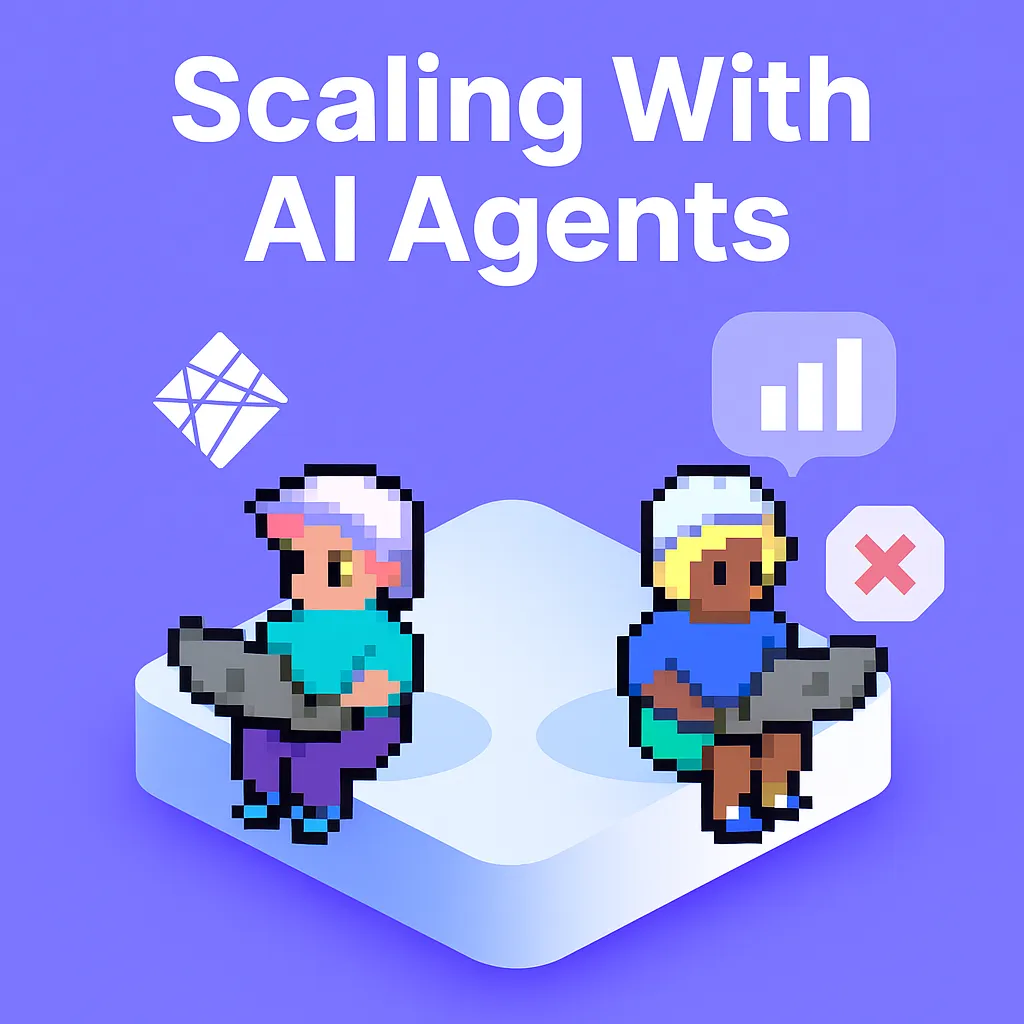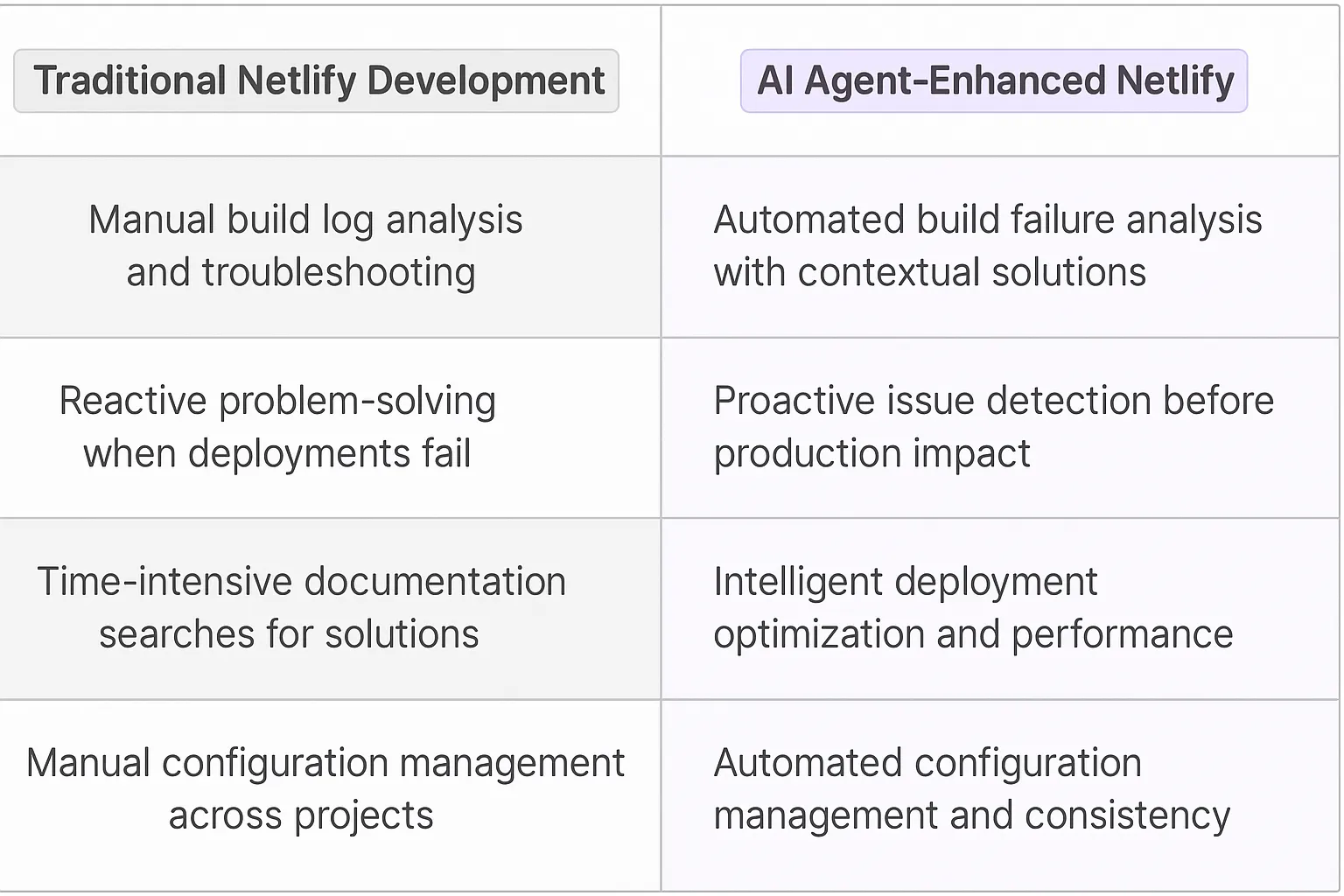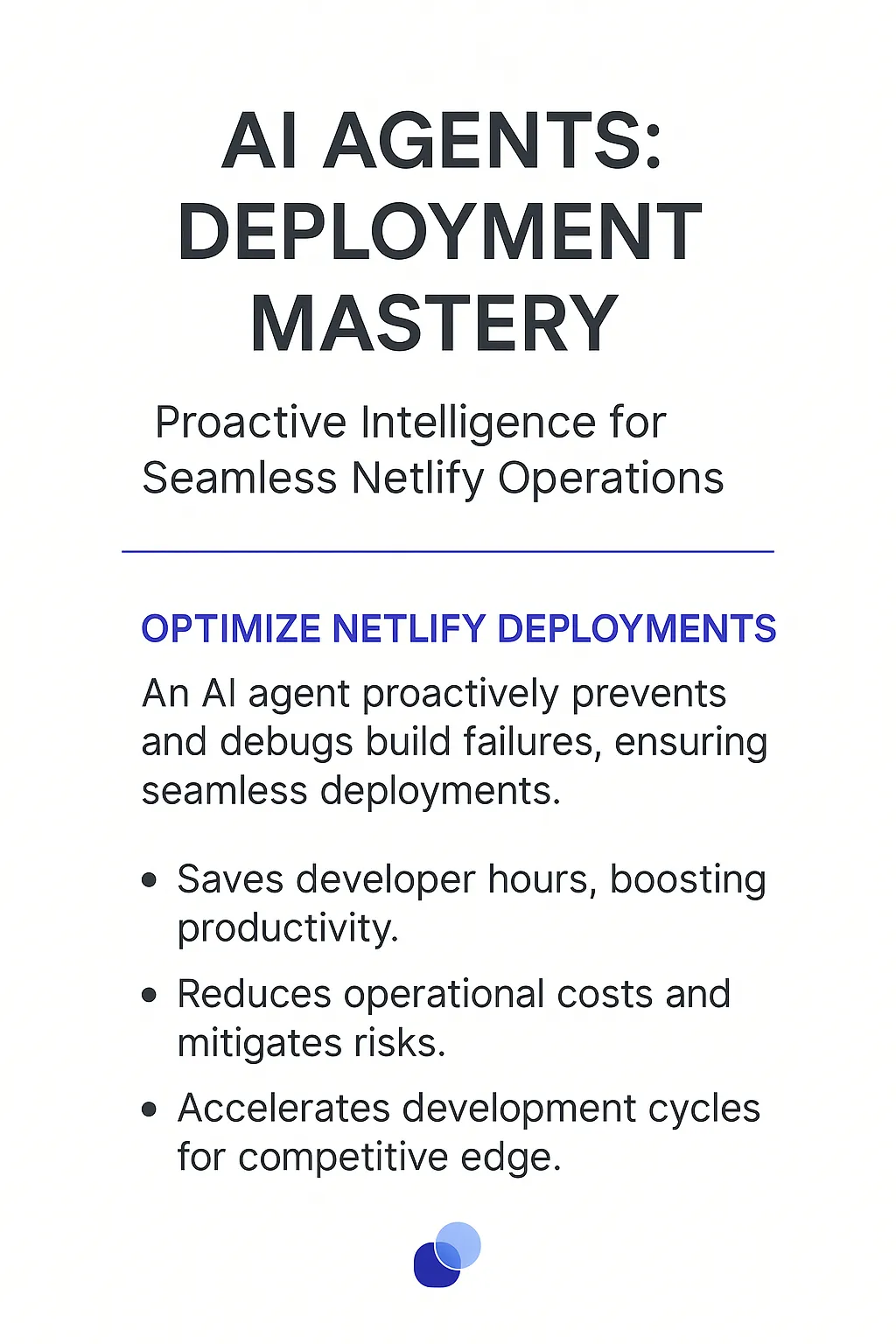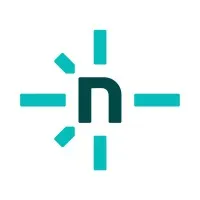Netlify
Understanding Netlify's Modern Web Development Platform
Netlify stands as a modern web development platform that unifies the elements of the modern decentralized web. It combines continuous deployment, serverless functions, and an intelligent CDN into a cohesive development environment. The platform eliminates traditional bottlenecks in web development by providing a seamless git-based workflow.
Key Features of Netlify
The platform excels in several critical areas:- Git-based continuous deployment with atomic builds- Edge network distribution with intelligent caching- Serverless functions for dynamic functionality- Form handling and user authentication- Split testing capabilities- Custom domain management- Build plugins and extensibility options

Benefits of AI Agents for Netlify
What would have been used before AI Agents?
Before AI agents entered the Netlify ecosystem, developers relied on traditional documentation searches, community forums, and support tickets to troubleshoot deployment issues. They spent countless hours manually combing through build logs, debugging configuration files, and deciphering cryptic error messages. The process was time-intensive and often led to deployment bottlenecks.
What are the benefits of AI Agents?
AI agents fundamentally transform how developers interact with Netlify's deployment platform. These digital teammates analyze build failures in seconds, providing precise, contextual solutions rather than generic documentation links. They can spot patterns in deployment logs that would take humans hours to identify.
The real power comes from their ability to understand the full context of a project. When a build fails, they don't just point to the error - they examine the entire build configuration, dependencies, and deployment history to provide comprehensive solutions. This deep analysis helps catch issues that might slip through manual reviews.
For teams managing multiple sites, AI agents excel at maintaining deployment consistency. They can proactively flag potential issues before they cause problems in production, reducing downtime and improving site reliability. The agents learn from each interaction, becoming more effective at predicting and preventing common deployment pitfalls.
Most importantly, these AI agents serve as force multipliers for development teams. They handle routine troubleshooting tasks, allowing developers to focus on building features rather than fixing deployment issues. This shift from reactive problem-solving to proactive optimization represents a fundamental improvement in the deployment workflow.
The network effects are particularly powerful - as more developers use these AI agents, the knowledge base expands, making the entire system more robust and effective for everyone in the Netlify ecosystem.

Potential Use Cases of AI Agents with Netlify
Processes
AI Agents can transform how development teams interact with Netlify's deployment infrastructure. When integrated with version control systems, these digital teammates monitor build processes and proactively identify deployment bottlenecks. They analyze build logs in real-time, detecting patterns that typically cause deployment failures before they impact production.
The agents can orchestrate complex deployment workflows by automatically managing branch deployments, staging environments, and production releases. They learn from historical deployment data to optimize build configurations and suggest performance improvements specific to each project's architecture.
Tasks
Development teams can leverage AI Agents for granular Netlify tasks that traditionally require manual intervention:
- Analyzing and optimizing asset bundling configurations
- Managing environment variables across different deployment contexts
- Monitoring build minutes usage and suggesting optimization strategies
- Automating DNS configuration and SSL certificate management
- Generating and maintaining redirect rules based on site structure changes
- Debugging failed builds by providing contextual solutions
The real power emerges when AI Agents handle the cognitive load of deployment management. They can parse through build logs, identify recurring issues, and implement fixes without developer intervention. For high-traffic sites, these agents monitor performance metrics and automatically adjust CDN configurations to optimize content delivery.
When teams scale their Netlify deployments, AI Agents become particularly valuable for managing complex multi-site architectures. They can coordinate deployments across multiple projects, ensure consistency in configurations, and maintain deployment schedules that minimize potential conflicts.
The network effect kicks in as these agents learn from deployment patterns across different projects. They build a knowledge base of common issues and solutions, effectively creating a self-improving system that gets smarter with each deployment cycle.
Advanced Integration Scenarios
For sophisticated use cases, AI Agents can bridge Netlify with other development tools:
- Coordinating with CI/CD pipelines to optimize test coverage before deployments
- Integrating with content management systems to schedule content-aware deployments
- Managing split testing scenarios and analyzing user behavior data
- Automating security scanning and vulnerability assessments during deployment
The compound effect of these integrations creates a deployment ecosystem that's both more efficient and more reliable. Teams can focus on building features while their digital teammates handle the complexity of modern web deployment infrastructure.

Industry Use Cases
AI agents within Netlify unlock powerful capabilities across multiple sectors, fundamentally changing how teams build and deploy web applications. The integration points between AI and Netlify's core infrastructure create unique opportunities for organizations to enhance their development cycles.
When examining real-world applications, we see AI agents in Netlify operating as force multipliers - they're not just handling routine tasks, but actively participating in complex development workflows. From e-commerce platforms leveraging AI for automated testing to media companies using intelligent build optimizations, the applications are both broad and deep.
The most compelling aspect is how these digital teammates integrate seamlessly with Netlify's existing features like continuous deployment, edge functions, and form handling. This creates a multiplier effect where the AI's capabilities enhance every layer of the development stack.
Looking at specific industry implementations reveals patterns of how organizations are combining AI agents with Netlify's architecture to solve previously intractable problems. The following examples demonstrate how different sectors leverage this powerful combination to create meaningful business impact.
E-commerce Growth with Netlify AI Agents
E-commerce businesses face intense pressure to maintain engaging, high-converting product pages while managing thousands of SKUs across multiple markets. The traditional approach of manually updating product descriptions, meta tags, and promotional content simply doesn't scale.
A Netlify AI Agent transforms this process by autonomously generating and optimizing product content across an entire e-commerce catalog. When integrated with platforms like Shopify or WooCommerce, the agent continuously analyzes product performance data, customer feedback, and search trends to refine product descriptions and metadata.
For example, when a fashion retailer adds new seasonal inventory, the AI agent automatically:- Creates SEO-optimized product descriptions that highlight key features and benefits- Generates meta descriptions and alt text for product images- Adapts content for different market segments and languages- Flags potential inventory issues based on historical data- Suggests product bundling opportunities
The real power emerges when the agent starts identifying patterns in customer behavior and purchase data. It might notice that customers who buy winter coats often search for specific terms like "waterproof" or "insulated," then proactively update product descriptions to feature these keywords more prominently.
This level of automated content optimization typically drives 15-30% improvements in organic traffic and conversion rates. For mid-sized e-commerce companies managing 5,000+ SKUs, this can translate to hundreds of thousands in additional revenue without expanding the marketing team.
The key insight: AI agents aren't just handling routine content tasks - they're becoming strategic partners in merchandising and conversion optimization, working 24/7 to maximize every product's performance.
Media Publishing Transformation with Netlify AI Agents
Digital publishing faces a fundamental challenge: producing high-quality content at scale while maintaining editorial standards and audience engagement. Traditional newsrooms struggle with the sheer volume of content needed across multiple platforms and formats.
A Netlify AI Agent acts as a force multiplier for media teams by handling the technical and repetitive aspects of content production and distribution. The agent works alongside editors and writers, focusing on tasks that benefit from pattern recognition and data analysis.
The agent's capabilities become particularly powerful when integrated into a publishing workflow:- Automatically formats articles for different platforms (web, mobile, AMP)- Generates SEO-optimized headlines and meta descriptions- Creates smart content taxonomies and internal linking structures- Identifies trending topics from social signals and search data- Flags potential factual inconsistencies or editorial issues
One of the most compelling aspects is how the agent learns from reader behavior. When analyzing engagement patterns across thousands of articles, it might discover that certain story structures or headline formats consistently drive higher completion rates. These insights help editors make data-driven decisions about content strategy.
The numbers tell the story: Media organizations using AI agents typically see a 40% reduction in technical publishing tasks and a 25% increase in audience engagement metrics. For a mid-sized publisher producing 100+ pieces weekly, this translates to dozens of hours redirected to high-value editorial work.
The network effects are particularly interesting - as the agent processes more content, it builds an increasingly sophisticated understanding of what resonates with specific audience segments. This creates a powerful feedback loop that continuously improves content performance.
The core insight: AI agents are evolving from basic automation tools into sophisticated publishing partners that enhance both operational efficiency and editorial impact. They're not replacing journalists - they're amplifying their ability to serve readers effectively.
Considerations and Challenges
Implementing AI agents within Netlify's ecosystem requires careful navigation of both technical complexities and operational hurdles. The integration process demands strategic planning and awareness of several key factors.
Technical Challenges
API rate limiting poses a significant constraint when deploying AI agents across Netlify sites. Teams must implement robust queue management systems to handle concurrent requests without hitting API thresholds. Additionally, the varying latency between different Netlify regions can impact agent response times, requiring sophisticated caching strategies.
Memory management becomes crucial as AI agents process large datasets or handle multiple user sessions. Without proper optimization, these agents can consume excessive computational resources, potentially affecting site performance and deployment costs.
Operational Challenges
Training AI agents to understand specific deployment contexts and build processes requires substantial investment in data preparation and model fine-tuning. Organizations often underestimate the time needed to achieve reliable performance across different use cases.
Version control and deployment synchronization present another layer of complexity. Teams must establish clear protocols for updating AI models while maintaining compatibility with existing build configurations and deployment pipelines.
Security Considerations
AI agents with access to deployment processes and configuration files need robust security measures. Implementing proper authentication mechanisms and access controls becomes critical to prevent unauthorized modifications to build settings or content distribution.
Regular security audits should scan for potential vulnerabilities in AI agent interactions, especially when handling sensitive data or accessing protected resources within the Netlify environment.
Cost Management
The computational demands of AI agents can significantly impact hosting costs. Organizations need to implement usage monitoring and establish clear metrics for ROI assessment. Setting up cost allocation frameworks helps track expenses across different projects and teams using these digital teammates.
AI Agents: Transforming the Future of Web Development
The integration of AI agents with Netlify marks a significant shift in web development practices. These digital teammates don't just automate tasks - they fundamentally enhance how teams build and deploy web applications. The network effects of this integration create a continuously improving system where each deployment makes the entire ecosystem smarter.
The impact extends beyond individual productivity gains. Teams using AI agents with Netlify report significant reductions in deployment issues, faster problem resolution, and more time for strategic development work. As these systems evolve, they'll continue to reshape how we think about web development and deployment processes.
The key to success lies in understanding that AI agents aren't replacing developers - they're amplifying their capabilities and allowing them to focus on higher-value tasks. Organizations that embrace this shift while carefully managing the technical and operational considerations will find themselves well-positioned for the future of web development.













